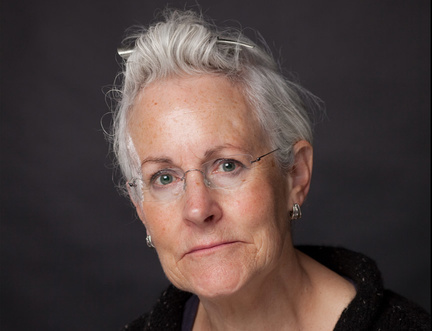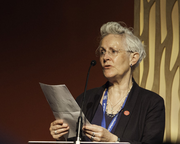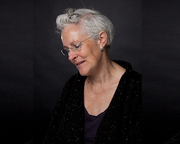Freedom
By Vivian French

In 2018, we commissioned 51 authors from 25 countries to write essays exploring ideas about freedom for The Freedom Papers, a publication produced in partnership with Gutter Magazine. Read on for Vivian French's essay, and visit guttermag.co.uk to purchase a copy of The Freedom Papers.
When I was little and complaining about the injustices of having to pick my clothes up off the floor and tidy my room, my grandfather would emerge from behind his newspaper and blink owlishly at me. ‘“Man”’ he would pronounce, ‘and that, Vivian, is a generic term that most definitely includes children, “is born free, and everywhere he is in chains.” Throw off your shackles and run wild.’ My grandmother would snort her disapproval. ‘Really, Sidney! What would happen if we all ran wild? Too much freedom, and civilisation, such as it is, would collapse.’ And I’d be hustled off for a date with a duster and brush.
A few years later I thought to ask what he meant by chains. ‘Depends who you are,’ he said. ‘You need to find out for yourself. Your chains will be different from mine. Read lots of books; that’ll help you understand different people’s points of view. And always ask questions. When someone tells you something is right or wrong, ask them why.’
Another snort from my grandmother. ‘That’ll make her popular in school – I don’t think!’
So, at an early age, I picked up the idea that freedom means different things to different people... but I never really investigated further. I grew up, went on marches, worked, repressed my own children when they demanded the freedom to throw clothes on the floor, and began writing stories and working with children in schools and at festivals. And it gradually came into my mind that the children of today are hung about with chains, chains that suppress their ability to communicate... chains that suppress their freedom of speech.
Is that an extreme reaction? There’s no doubt that many teachers inspire their children, and should be celebrated, but there are others who feel so pressured by the rules and regulations imposed by the national curriculum that they dare not allow spontaneity.
An example.
I was invited recently to visit a school ‘to encourage a love of writing.’ I bounced into the classroom, and asked, ‘Who likes stories?’
Lots of little hands shot up.
‘Wonderful!’ I said. ‘And what’s the first thing you think of when I say the word, STORY?’
Fewer hands were raised. I chose a small boy. ‘Connectives,’ he said. I was disappointed, but didn’t wish to criticise. ‘Those are very useful. Anything else? What makes a really, REALLY good story that everyone will want to read?’
A little girl leapt to her feet, wildly waving her hand and squeaking, ‘I know! I know! It’s OPENERS!’
Not entirely sure what she meant, I looked at the teacher for enlightenment. ‘We use Openers to make our writing exciting, don’t we, children?’ She picked up an exercise book and handed it to the little girl. ‘Sherry, read Vivian your lovely story.’
Sherry took the book and began. ‘Excitedly, the boy jogs happily down the long road to the brilliant shops. ‘Hurray it’s my birthday,’ he exclaimed.’
The teacher beamed at me. ‘Sherry’s one of our best writers.’
Sherry nodded. ‘I didn’t use ‘said’ at all, Mrs Boon, did I? And I changed ‘ran’ into ‘jog’, didn’t I, Mrs Boon? That’s one of our WOW words, isn’t it, Mrs Boon?’
That’s a true story. (The names have been changed.) The terrible thing is that it wasn’t a one-off experience. All over the country I meet the same obsession with WOW words, the removal of any word in common usage in favour of something more ‘literary’ (how many children in the playground ‘exclaim’ to each other?), and the curious convolution of sentences in order to meet curriculum requirements. I have never in my entire life (three hundred books) begun a sentence with ‘Excitedly.’ Has anyone?
A small deviation here, to cheer you. I was in a school in Wales where the Key Stage One guidelines were treated with a polite disdain. The stories that the children had been allowed to write by themselves (my italics) were wonderful. One began, ‘Dark it was, and the mean biter of a wind was eating the heat out of our bones.’ That child was the same age as Sherry... but he’d never been subjected to fronted adverbials, or told about Openers, or Connectives. He had the freedom to write what he wanted, to enjoy the sound of words, and to experiment with phrasing and order. The English language is a glorious mishmash; it’s often weird, infuriating and irrational – but when used to full effect it can reduce you to floods of tears, or send you singing into the night.
So what are we doing to our children? Will they have the potential to be writers of passion and originality, or will any faint stirrings of creativity have been stifled? When I ask the children in primary schools if they actually enjoy writing, I don’t get a hugely enthusiastic response. ‘There are too many things to remember,’ an eight-year-old told me. A ten-year-old said, ‘I can’t write what I want to. It always has to be a ‘response’ to something the teacher’s read to us, or some kind of diary, or a description.’
So... my war cry, my rant, my answer to being asked to write an essay on freedom is this. Let children wallow in language, in books, in words... words they may not immediately understand, but that they’ll come to love. Let them write from the heart, from a real desire to communicate. Throw off the shackles, the chains, and set them free!
Words are powerful. Incredibly so. Words, spoken or written, can change civilisations; surely then we should make certain that every child grows into adulthood with the ability to comprehend, argue and discuss with skill and fluency? But will they? And that’s the question.
Copyright © 2018, Vivian French. All rights reserved.
Supported by the Scottish Government’s Edinburgh Festivals Expo Fund through Creative Scotland.



 Major new partnership with Celtic Connections
Major new partnership with Celtic Connections 

